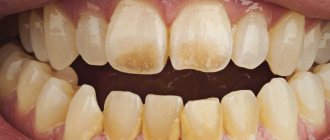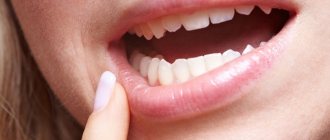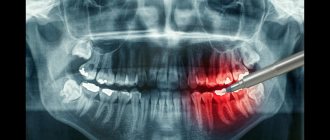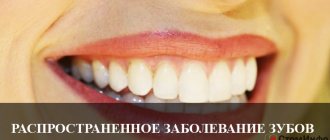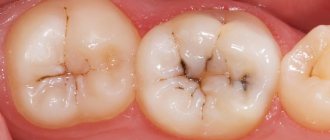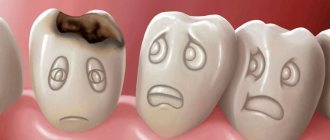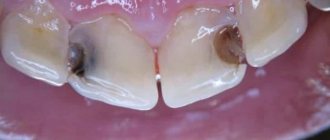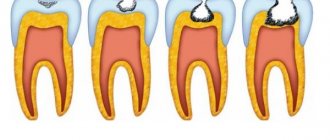Activated carbon for teeth
The cleansing properties of activated carbon are probably familiar to many, because they were used in ancient Rus'.
The pieces were pounded in a mortar and then rubbed against the teeth. Today, the composition of the tablets has changed and, in addition to the wood base, there are other organic components. Coal that contains fruit seeds and nut shells is considered to be of high quality.
Brushing teeth with activated carbon
If you use activated carbon on your teeth, its harm and benefits can be numerous.
For example, the advantages include the following:
- quick visible results;
- not high cost;
- the ability to remove old plaque from teeth;
- availability;
- safety of use.
Many dental methods for cleaning teeth can be disadvantageous, especially when it comes to cost and availability.
Disadvantages include:
- The enamel has a detrimental effect. If the procedure is carried out frequently, the harm is obvious, because the powder obtained from activated carbon erases the top layer of teeth. Microcracks will begin to form; initially they are not noticeable, but will become larger and larger. With a reasonable approach to the procedure, such risks can of course be minimized.
- Duration of the procedure. It is quite difficult to remove all the coal after the procedure; it will continue to remain in all hard-to-reach places.
Before starting the procedure, you need to weigh the pros and cons, because you can not only achieve benefits, but also cause harm.
Face whitening results
Unlike other home methods of teeth whitening, this one is considered the safest. If pieces of tablets get into the stomach along with saliva, there will be no negative effect. There is no adverse effect on the oral mucosa.
But who needs to refrain from the procedure:
- People who have recently had their braces removed are advised to avoid the procedure.
- The procedure should be carried out with caution for those whose teeth are sensitive and whose enamel is thinned. Those with caries can be included here, because the protective layer of their tooth is already thinned, and under the influence of abrasive particles it will be destroyed even more.
It is not recommended to carry out such procedures in childhood, since it is easy to destroy the protective enamel at this age.
There are many recipes for teeth whitening with activated carbon. The simplest method is to mix the tablets with water and apply the resulting mixture to your teeth.
It is better to use a fingertip rather than a toothbrush for this. The powder must be crushed first, otherwise you will have to wait a long time for the tablets to dissolve.
For cleaning it is recommended to use powder from tablets
Here are some more simple recipes:
- Mix charcoal powder and toothpaste. Apply to teeth exactly as described above, after a few minutes remove everything.
- It is effective to combine a decoction of oak bark and charcoal powder. In addition to lightening the enamel, you can improve the condition of your gums.
- Dilute the tablets with water to a paste, add a few drops of lemon juice. In case of increased tooth sensitivity, it is not recommended to use.
- The combination of baking soda and charcoal instantly gets rid of plaque. Take the powders in equal quantities, dilute with water to a paste, and gently rub into your teeth. This is a fairly aggressive cleansing, so it should only be used as a last resort.
When you don’t have time to use any recipe, you can simply chew several tablets of activated carbon, trying to move the pieces in different places in the oral cavity.
Is honey harmful to teeth?
Honey has a beneficial effect on the entire body, including teeth. It contains fluoride and has a bactericidal effect, which prevents caries, disinfects the oral cavity and strengthens tooth enamel. This beekeeping product is used for periodontal disease and gingivitis - honey applications are applied to the gums, which need to be kept for 5-10 minutes.
After the procedure, it is important to rinse your mouth thoroughly with clean water to remove sugar and prevent the development of pathogenic microorganisms
According to reviews, honey is good for teething in children. If you feel pain, you need to rub honey into the gums - this procedure relieves pain well and helps the child fall asleep. It is only important to make sure that the baby is not allergic to bee products.
Chewing honeycomb has a beneficial effect on teeth and gums. In addition to honey and wax, they contain propolis, which has antiseptic, anti-inflammatory and antibacterial properties. By chewing honeycombs, a person takes care of the oral cavity and reduces the risk of developing caries.
Even chewing wax lumps itself helps to mechanically cleanse teeth of plaque. But with prolonged contact of honey with tooth enamel, the sweet product can weaken it. Therefore, after using honey and honeycombs, it is better to rinse the mouth with water.
Teeth Whitening with Honey An excellent teeth whitening agent is fresh honey combined with fine sea salt. The components must be mixed in equal quantities. This paste should be used once a week using a toothbrush.
You can clean with your finger, massaging problem areas on your teeth and gums and rubbing a natural whitening agent into them.
We invite you to familiarize yourself with the 11 fastest and most effective tablets for toothache
Honey with salt not only whitens teeth, but also reduces bleeding gums
Honey brings benefits to the whole body only if it is high-quality, natural and used in reasonable quantities. Buy healthy treats only from trusted beekeepers and do not forget to rinse your mouth thoroughly after honey procedures.
Honey – what is good for teeth in it?
Honey is used as a medicine for many diseases. It can be classified as a number of biologically active substances. To understand the mechanism of its action on the oral cavity and teeth, it is necessary to have an idea of the chemical composition. This unique beekeeping product includes many elements valuable for the human body, and their combination depends on many factors.
Of the 400 biologically active compounds in honey, only 100 have been fully studied. Every dentist will confirm that preventing dental diseases with honey will allow you to avoid terrible treatment in the future. Minerals are represented by more than 40 elements that help strengthen teeth and adjacent tissues.
Among the useful compounds there are also potassium, phosphorus, calcium, chlorine, sulfur, sodium, magnesium. Since these substances are of natural origin, there is no doubt about the magical properties of bee medicines. These sweet foods are essential for the normal functioning of the body. When immunity is high, the body will quickly recover from diseases, including those related to teeth.
Compound
The secret lies in the substances contained in honey.
It is rich in calcium, which is known to be the basis for the formation of bone tissue, which includes teeth. Phosphorus guarantees a white smile. Fluoride is considered the best protector against caries. Honey is also rich in a variety of micro- and macroelements, which also have a positive effect on the strength of bones and their resistance to negative influences. It also contains all the vitamins necessary for teeth, including C (for bone regeneration), A (for smooth enamel), D (for better absorption of calcium and phosphorus) and so on. Therefore, honey is often recommended as a preventative against dental diseases. To do this, you need to consume 2 teaspoons of the product every day, either in its pure form or with milk or tea.
Is smoking harmful?
The harm of smoking to teeth is obvious. During this process, hot tobacco smoke enters the mouth along with hydrocyanic acid, methane, nicotine and other harmful components.
Due to high temperature, the enamel is damaged, inflammation develops on the mucous membrane, and beneficial microorganisms die. However, this is the very beginning of harm, because the worst is yet to come.
Result of smoking
Under the influence of nicotine, blood vessels in all organs and tissues narrow. Blood circulation is impaired, the mucous membrane of the gums atrophies. Gradually, they will flake off, and the roots of the teeth will be exposed.
First, smokers will begin to develop chronic gingivitis, and then periodontal disease. There is a high probability that a person will lose not only diseased teeth, but also healthy ones. The gums will begin to bleed and turn red.
After tobacco smoke enters the body, resinous substances settle in the oral cavity, and a thin plaque forms on the teeth. Its quantity is sufficient for pathogenic microorganisms to begin to multiply, which, when accumulated, will turn into thick plaque. Tooth enamel will not only change color, but will gradually begin to deteriorate.
In addition to all this, tobacco smoke burns the mucous membrane in the mouth and it becomes dry. The amount of saliva decreases sharply, and the risk of developing caries, periodontal disease, pulpitis and other diseases increases.
Various diseases develop in the oral cavity
Substances contained in tobacco smoke, after entering the oral cavity, will begin to slow down the regeneration processes, treatment will be slowed down, and the mucous membrane will not be able to recover on its own.
A few years after constant smoking, every smoker notices that his teeth become yellow. Even the most expensive pastes cannot get rid of plaque. An unpleasant odor appears from the mouth. Moreover, at first it appears after sleep, and then does not disappear at all.
And this is not all that awaits a heavy smoker. You will have to visit the dentist often because pulpitis, caries and other diseases will develop. After several years of smoking, your teeth will become dilapidated, and this is a good reason to think about getting crowns.
The effect of cigarettes on teeth is far from an external inconvenience. Diseases of the oral cavity will become a constant source of infection, and the body will begin to suffer from the inside.
Main causes of loosening
The causes of inflammatory processes in the gums can be very different. Their manifestations in the oral cavity can also be different. These may be ulcers on the cheeks, a red rash on the palate in adults, a taste of pus in the mouth, a bubble or blister on the gum, sores in the mouth, a sore tooth, a hole or a hard growth on the gum. Long-term inflammation of the mucous membranes can degenerate into an abscess on the gums. In this case, the wound in the mouth is most often painful and bleeds.
Any inflammatory process of the mucous membranes of the oral cavity is aggravated by the microflora of the oral cavity. Therefore, treatment of gums and strengthening of teeth is carried out using antiseptics and antibiotics.
SIGN UP FOR A FREE CONSULTATION
Baking soda is useful for treating gums at home. We will prepare a soda-based rinse solution. You will need 200 grams of water, a teaspoon of soda, a pinch of salt and a sage decoction (about 50 grams). Mix the ingredients. Rinse at least four times a day.
Aloe compress - wash the plant leaf, remove the thorns and cut lengthwise. Apply to gums for 15 minutes.
Self-treatment of gums at home - chamomile and calendula. These plants relieve inflammation well. To prepare the infusion, you will need a tablespoon of chamomile or calendula, pour boiling water over the herb (a glass will be enough). Let it brew. Strain. Alternate infusions.
Even if all hygiene rules are followed, teeth can still begin to become loose. This can be influenced by various factors, including:
- the presence of pathologies of the oral cavity, for example, gingivitis, periodontitis and other ailments;
- chronic diseases (psoriasis, arthritis, diabetes, etc.);
- dental caries or tartar;
- bruxism (teeth grinding) or mechanical damage to the teeth;
- neglect of personal hygiene rules;
- weak immune system;
- avitaminosis;
- hereditary factor;
- malocclusion;
- use of certain medications;
- during pregnancy or breastfeeding, as well as during puberty, when hormonal imbalance occurs in the female body.
Causes of loose teeth
It is advisable to take a closer look at some of the reasons. We are talking about pathologies of the oral cavity.
- Malocclusion occurs as a result of improper alignment of teeth. This anomaly is accompanied by an uneven load on the dentition. As a rule, pathological bite most often occurs on the front teeth.
- Periodontal disease. A chronic disease of the human oral cavity, which is accompanied by the appearance of an inflammatory process and bleeding gums. Incorrect treatment or its complete absence leads to gradual destruction of the bone structure. This is the main factor in the occurrence of loose teeth.
- Periodontitis is an inflammation of the patient’s gums, as a result of which the teeth begin to become loose.
- Gingivitis occurs as a result of the development of microorganisms in the oral cavity. As a rule, this occurs due to non-compliance with personal hygiene rules. The disease is accompanied by bleeding and swollen gums, but if treated incorrectly or untimely, more serious symptoms can occur.
Gingivitis
Inflammation of the gums can also be caused by bad habits that contribute to the leaching of beneficial substances from the body. Let's look at the main habits that you should give up.
- Drinking alcohol and smoking lead to damage to tooth enamel. Cigarettes and alcohol also weaken the immune system.
Smoking and alcohol are harmful to tooth enamel
- Coffee in large quantities is also bad for the gums, so dentists strongly recommend drinking this drink no more than 3 cups per day.
- Hot food has a detrimental effect on the gums. Try to avoid foods that are too hot to protect your smile. This also applies to drinks.
- Mechanical impact on teeth can cause small cracks on their surface, as well as increase tooth sensitivity. If you like to crack walnuts or open beer with your teeth, then you also need to give up such habits.
What habits should you give up?
On a note! By weaning yourself from habits harmful to your teeth and gums, using effective folk methods of strengthening, you can achieve the desired result in just 3-4 weeks. Regular use of traditional medicine recipes will significantly improve the health of your teeth.
We suggest you read: Herpes in the mouth: causes, symptoms (photos), treatment
Just like human hair or skin, teeth and gums require constant attention. Many modern products are packed with various food additives that can negatively affect your health. In addition, such food contains a lot of sugar, which has a detrimental effect on the teeth.
Because of this, proper care for them is very important. In addition to traditional medicine, there are also folk remedies that can strengthen gums even in the most severe cases.
Let's look at the most common recipes for folk remedies that are not inferior to pharmacy ones in their effectiveness.
Propolis
It is no secret that propolis is used to treat many diseases due to its beneficial properties. It is also used in folk medicine to restore gums, providing a protective and disinfecting effect on the body.
The process of preparing the solution is quite simple. You just need to mix 200 ml of boiled water and 1 tsp. propolis. Use the prepared product several times a day.
The duration of the treatment course is 14 days, after which take a 2-month break.
Propolis
Homemade honey toothpaste
The use of honey for dental treatment is also supported by toothpaste manufacturers. It contains a large number of microelements that can be useful for the prevention of caries. Sometimes on store shelves you can find toothpaste containing natural beekeeping products. They are very good for teeth. But this type of pasta can be prepared at home.
Toothpaste recipe
For preparation you will need the following ingredients:
- 70 grams of white clay;
- 1 teaspoon honey;
- 2 drops of sage and chamomile essential oil;
- 5-10 drops of water-based propolis.
Making pasta is very simple. The clay is mixed with honey in such proportions as to obtain a paste-like slurry. Then propolis is added to the resulting mixture and mixed thoroughly again. At the next stage, any essential oils are dripped into the mixture. Then all the components are mixed again and a toothpaste is obtained, which can strengthen tooth enamel and disinfect the oral cavity.
The formation of caries occurs with the participation of pathogenic microorganisms. Honey destroys most types of bacteria, so it can be used to prevent tooth decay.
Seeds and teeth
A favorite pastime for many is cracking roasted sunflower seeds in front of the TV and watching their favorite series. But few people think about whether seeds are harmful to teeth and how often they can be cracked.
Due to constant clicking of teeth, teeth are ground down
If you can’t live a day without popping your favorite seeds, then you need to find out what consequences you can expect for your body and teeth:
- with frequent clicking of seeds, the tooth enamel of the front teeth will begin to deteriorate, the nerve endings will gradually become exposed, and caries will begin to develop;
- due to frequent consumption of seeds, heartburn may develop;
- The seeds are high in calories; if you tend to be overweight, you should not husk them often.
The harm of the seeds is that they can have a negative effect on the vocal cords, which is why it is not advisable for singers to get carried away with them.
If desired, you can eat ready-made grains
Constant clicking will cause the enamel to become thin and then even crack. You have to go to the dentist to have your teeth treated.
There are also craftsmen who crack seeds with their molars while manipulating their tongue. After such a meal, the condition of the oral cavity leaves much to be desired, abrasions appear on the mucous membrane, and new chips appear on the enamel.
In view of all these factors, we can conclude that the seeds are not so healthy, and if you really need them, then it is better to eat ready-made grains.
Strengthening gums is the key to healthy teeth
A disease such as periodontal disease can lead to tooth loss over time due to progressive atrophy of the alveolar processes. In the initial stages, the disease can be easily cured. At later stages, most treatment methods do not bring much effect. Using honey can significantly improve the condition of the mucous membrane.
For the composition, crushed table salt and honey are taken in equal quantities. They are thoroughly mixed. It is recommended to rub the resulting composition into the gums for 5-7 minutes. This procedure must be carried out twice a day. Upon completion, the mouth is rinsed with water.
Natural honey for healthy gums and oral cavity (health recipe with honey)
A huge percentage of adults around the world suffer from various gum diseases. Inflammation of the gums is caused primarily by the proliferation of bacteria in the oral cavity. If the mouth is not cleaned in time, problems arise, including with the gums. For this reason, oral hygiene is especially important. In this article we will talk about how natural honey helps in promoting gum and oral health.
Of course, there are many factors that contribute to the occurrence of dental diseases. These include genetics, hormonal changes, poor nutrition, decreased immunity, bad habits, as well as the use of certain medications.
Mild gum disease includes gingivitis. This disease is characterized by increased sensitivity of the gums, swelling and bleeding. Bad breath gets worse. If you have gingivitis, you need extra careful daily oral care.
If you have a more advanced stage of gum disease, your gums are not close enough to the necks of your teeth, they hurt and bleed - then most likely it is periodontal disease. This form of gum disease requires special professional treatment and may even require surgery.
But is there anything else you can do to combat or reverse gum disease? Yes, there are several things you can do to achieve a healthy mouth.
Here are some simple tips to help you avoid or reduce the risk of gum disease: 1. Avoid bad habits, especially tobacco use 2. Drink plenty of water to keep your mouth hydrated 3. Visit your dentist regularly 4. Make the most of it products for oral hygiene. Be sure to brush your tongue with a toothbrush twice a day.
Honey for oral health
There is also a very simple, but extremely effective remedy for maintaining the health of your teeth and gums. This is honey. Thanks to its antiseptic properties, honey effectively cleanses and fights bacteria in the oral cavity. However, it is important to use only high-quality natural bee honey to prevent any diseases. Counterfeit sugar will only worsen problems with teeth and gums (you can buy natural honey in our store).
When it comes to natural honey, dentists claim truly miraculous results from using honey in the fight against bacteria and oral infections. Honey not only disinfects inflammation and destroys germs, it also saturates the body with many useful enzymes. Chestnut honey has the most pronounced bactericidal properties. But honey of other varieties will undoubtedly be effective.
How to use honey to prevent dental diseases? Very simple. Every time, morning and evening, after you brush your teeth and mouth with a toothbrush and toothpaste, take a drop of honey on your fingertip and slowly massage your gums for 3 minutes. This operation can be done using a soft toothbrush. Leave a small jar of honey in the bathroom and do this procedure regularly. The results will pleasantly surprise you very soon. In just 2-3 weeks you will feel your gums getting stronger.
Another excellent preventive remedy is a solution with honey for rinsing your mouth. Dilute half a teaspoon of honey in a glass of cool water and regularly rinse your mouth with this solution.
Using these simple recipes for healthy teeth, you can visit the dentist's office much less often. Be healthy and smile more often!
« back to list of articles
User comments
Add a comment
Entrance
Introduce yourself
Login via social media profile
An authorization confirmation window will open, after which you will be automatically returned to the site.
Similar articles
Steam bath with honey for the face (recipe for beauty and health with honey)
Quality skin care doesn't have to be expensive.
Nature has given us many means to preserve youth and beauty, which allow us to achieve amazing results. One of the main such riches is natural honey. ...read more Face mask with honey.
We fight acne and tone the skin At the beginning of spring, we already know with doom that our health and, consequently, our appearance will fail, which can lead to a bad mood and a bad mood with it.
This complex of minor misfortunes is called vitamin deficiency. Honey is a natural source of vitamins and essential microelements, an excellent way to tone and maintain immunity. A couple of recipes from “Mountain of Honey” to keep you in good shape! ...read in full Cleansing face mask with honey and turmeric (beauty recipe with honey)
At the end of winter, we already know with doom that all sorts of minor troubles with health, skin, hair await us... And this whole complex of minor misfortunes is called vitamin deficiency.
Its external signs are faded hair, brittle nails, chapped skin. Further – weakened immunity, weak resistance to runny noses and colds. We always try to avoid this, we buy vitamins, immunomodulators, express skin masks, etc. at the pharmacy...read in full Hair mask with honey and olive oil (beauty recipe with honey)
This is an emergency SOS hair mask with honey and olive oil help for those who are already tormented by split ends.
A mask with honey perfectly nourishes the scalp and has a beneficial effect on the hair follicles, which ultimately gives a wonderful visual effect of healthy, shiny hair. Regular use of this mask will relieve you of the problem of split ends and fill your hair with health. ...read in full Relaxation bath with milk, honey and lavender (beauty recipe with honey)
We all know how after a busy week you want to relax and relieve tension. Spa treatments are an excellent way to relieve stress. But often we simply don’t have enough time to go to specialized salons and centers. A good alternative to expensive spa treatments is a milk bath with lavender and honey, which anyone can prepare for themselves and their loved ones, right at home. We continue the series of recipes for cosmetics with honey for home use. …Read completely
Sea salt for teeth
Strengthening teeth in a dental office is not so easy, and not everyone can afford it. But you can solve the current problem yourself, and without even leaving your home.
Sea salt was often used to strengthen teeth. With its help, it is possible to strengthen the gums, prevent the development of decay, and eliminate bad breath.
Sea salt can be an excellent replacement for whitening toothpaste
But when using sea salt for teeth, the benefits and harms can be different. In addition to the fact that salt heals, it can harm sensitive teeth.
This salt is rich in various trace elements and minerals; they have a beneficial effect on teeth and gums. An additional role is played by calcium, iron, sodium, phosphorus. Thanks to the iodine content, it has bactericidal properties.
But what is the essence of the modern method of strengthening teeth in this way? Pour warm water into a glass and dissolve a spoonful of salt in it.
Brush your teeth with regular toothpaste, then rinse with the resulting solution. Many people prefer not expensive toothpastes, namely sea salt, but it should be very fine.
It is useful to rinse your mouth with saline solution
Wet your toothbrush, dip the bristles into the salt while it's wet, and brush your teeth as usual. You can alternate procedures, clean with paste in the morning and salt in the evening. In this case, the resulting disinfecting effect will be maintained until the end.
If your gums are constantly bleeding, use a saline solution. The salt concentration increases gradually.
After just a week of regular cleaning, you can see the first results. Not only your gums, but also your teeth will become healthy. The enamel will be a little whiter. Interesting! Due to the fact that salt has analgesic properties, it is recommended to rinse your mouth with it during toothache.
What folk remedies should you use?
Periodontal disease is an atrophic disease of the gums. As it progresses, it leads to loosening and loss of teeth. Treatment with home remedies can be carried out only in the first stage of the disease. In this case, there is no tooth mobility, but there may be unpleasant symptoms: itching, burning and bleeding gums.
You can relieve symptoms and stop the progression of the disease at home using pharmaceuticals and traditional medicine recipes. It must be remembered that plants often cause allergies, so they should be used with caution. If a pathological reaction of the body occurs, you need to call an ambulance and take an antihistamine.
When looking for how to treat periodontal disease at home, you should look at the pharmacy, on the windowsill or in your own refrigerator. There are many folk recipes that relieve symptoms and improve the patient’s well-being.
Aloe has an anti-inflammatory effect, relieving swelling and itching
Take a fresh leaf, cut off the spines and divide it into 2 parts. Apply the pulp to the gums at night. Substances in aloe juice have an antibacterial effect, which prevents the development of infectious complications.
Sap
The product is prepared from cedar resin and alcohol in a ratio of 1:5. The mixture is stirred until completely dissolved. The resulting solution is rubbed onto the gums with a cotton swab using massage movements. The procedure should be carried out in the morning and evening until the symptoms disappear completely.
Lingonberries contain substances that trigger cell regeneration
Lingonberry juice
Lingonberries contain substances that trigger cell regeneration. To cure periodontal disease, you need to squeeze out the juice, take it with a cotton swab and make a compress on the gums. The procedure time is 10-15 minutes. Apply the juice 2-3 times a day. The course of treatment is 2 months, but the positive effect is noticeable after a week of use.
pine needles
Needles have long been used to treat gums: they are actively added to pastes for periodontitis and periodontal disease. But this remedy is effective in its natural form. To do this, pine needles need to be collected, washed and dried from water.
Garlic with oils
People widely use the antibacterial properties of garlic during the cold season: they try to add it to dishes, hang it around children’s necks, and place it on their desk. It also helps with periodontal disease. For preparation take:
- 250 g garlic;
- 150 ml vegetable oil (olive or sunflower);
- 6 drops eucalyptus essential oil.
Garlic has antibacterial properties
Then the solution is filtered and essential oil is added. The resulting medicine is stored in a cool, dark place.
Compresses are prepared from the mixture on the gums. They are applied three times a day for 15-20 minutes. Treatment takes a month, but results are noticeable after 3-4 days.
Mouth rinsing for periodontal disease serves as an excellent prevention of disease progression and treatment in the early stages. Water of different temperatures (warm, cool) is suitable for this. You can replace it with decoctions of medicinal herbs, special rinses and pharmaceutical products to achieve greater effect.
Hydrogen peroxide
A mouthwash solution can be prepared from 3% hydrogen peroxide. It is diluted in a ratio of 30 drops per glass of water. The resulting solution is thoroughly rinsed in the mouth so that it gets on the gums.
Rinsing with a soda solution normalizes pH and helps cope with inflammation.
Citrus fruits are rich in vitamin C, and lemon is also rich in acids. Together they can boost immunity and stop the development of the disease. To do this, just put a slice of lemon in a glass and fill it with hot water. When the solution has cooled, they need to actively rinse their mouth. The procedure is repeated 2-3 times a day until the symptoms disappear completely.
Mouthwash can be made from sea salt or table salt. It is enough to add 1 tsp. powder into a glass of warm water and stir. Rinsing should be done twice a day for a week.
Oak bark
Oak branches contain a large amount of astringents that stop bleeding. Therefore, a decoction is prepared from them for rinsing during periodontal disease. To do this, small oak branches are poured with boiling water and boiled over low heat for several minutes.
We invite you to read: Crooked teeth - why pathology develops and whether it can be corrected
Gargling with oak bark decoction works great for bleeding gums.
Apple cider vinegar
You can prepare a mouthwash solution from acetic acid (not essence!). It perfectly stops bleeding and strengthens the gums. To obtain a solution, you need to dilute 1 tsp. apple cider vinegar in half a glass of water.
The rinsing procedure is carried out 3 times a day for 3 minutes. You need to be treated for at least 1 month to achieve a lasting positive effect.
Chamomile
The antiseptic properties of chamomile are used in dentistry to treat periodontal disease. To get a rinse solution, just brew a bag of tea from a pharmacy or a tablespoon of flowers. It is more convenient to use chamomile in bags, since you do not have to pass the solution through gauze.
Rinsing is carried out after each brushing of teeth. It usually takes up to 14 days from the start of treatment until symptoms disappear.
Chlorhexidine
The inexpensive but effective antiseptic Chlorhexidine will help eliminate inflammation and prevent the development of complications. To do this, just rinse your mouth with it twice a day. After two weeks of use, the symptoms of periodontal disease completely disappear. If this does not happen, you should consult a doctor to select another remedy.
Stomatophyte
The drug "Stomatofit" does not contain antibiotics or hormones, therefore it is safe for adults and children. The drug based on medicinal herbs perfectly relieves inflammation and has a healing effect.
For rinsing, the product is diluted in water according to the instructions in accordance with age. The positive effect is noticeable after the first week of use.
Stomatophyte has an anti-inflammatory and healing effect
Rinse aids
You can treat periodontal disease at home with rinses from the range of your nearest pharmacy. They relieve inflammation, strengthen gums and give fresh breath. The best rinses for periodontal disease:
- Parodontax - contains fluoride, destroys bacteria;
- Splat - contains polydon, biosol and nettle extract;
- Lakalut - relieves bleeding due to astringent components;
- The President is a pro - destroys bacteria, treats inflammation using extracts of medicinal herbs.
The individual characteristics of the body do not allow us to draw conclusions about which remedy is the most effective. After all, periodontal disease has several symptoms, each of which can act as a leading one. And a patient with and without inflammation needs different medications.
Improvement occurs most quickly when taking antibiotics. But these are strong drugs that are prescribed according to indications and sold with a prescription.
Gums with periodontal disease become loose, and the risk of injury increases. Therefore, you should choose a soft brush to brush your teeth. And during the hygiene procedure, you can additionally massage the gums. This serves to prevent the development of periodontal disease.
Weak and bleeding gums are often the result of insufficient blood supply. To improve it, massage is recommended. It can be carried out with your fingers, but a greater effect can be achieved with a stream of water. Since treating gums at home for periodontal disease is more convenient than visiting the dentist every day, patients are recommended to purchase an irrigator.
The device produces a stream of water under pressure, which perfectly massages the gums. This also improves the quality of mechanical cleaning of plaque. As a result, the patient receives not only treatment of periodontal disease, but also prevention of caries and inflammatory diseases of the oral cavity.
The irrigator stimulates blood circulation in the gums, strengthens the mucous membrane
Soreness and bleeding of the gums, as well as loose teeth, impose dietary restrictions on the patient. Useful products for periodontal disease:
- solid foods - carrots, apples, cucumbers: provide a natural massage of the gums, contain many vitamins and minerals;
- dairy products - kefir, cottage cheese, sour cream, yoghurts: rich in calcium, strengthen teeth;
- citrus fruits - lemons, oranges, tangerines: contain vitamin C, which boosts immunity and has an anti-inflammatory effect.
Oral hygiene
What did our ancestors do if their teeth hurt?
Honey for toothache was widely used by people back in the days when dentists did not exist. To do this, it was taken in equal quantities with cinnamon, the ingredients were carefully mixed, and the resulting mixture was applied to the aching tooth.
Some time after this procedure, the pain decreases significantly, and then goes away completely. But this does not mean that the tooth is cured. A home remedy can only temporarily relieve attacks of pain, and you will still have to treat the tooth in the traditional way.
The effect of fluoride on teeth
Speaking about fluoride, its benefits and harm to teeth are obvious. Many people pay special attention to this component because it is included in many toothpastes. Fluorine is essentially a gas. In industry, it is often combined with other substances.
It is a natural element; it is impossible to overestimate its role in our lives. Tap water also contains small amounts. Thanks to fluoride, it is possible to maintain the condition of tooth enamel and bone. Its accumulation in bone tissue begins from birth; it is involved in many vital processes.
Fluoride and calcium are essential for strong teeth
In an acceptable amount, fluoride brings great benefits to teeth, its main advantages are as follows:
- prevents the appearance of tartar;
- forms a protective film on the enamel surface;
- makes enamel stronger;
- prevents the formation of lactic acid in the oral cavity.
Beneficial properties will be provided only if the dosage of the substance is observed. If there is an excess, unpleasant consequences can occur for the entire body. Below we look at other beneficial properties of fluoride.
Fluorosis is a disease that can develop due to a lack of fluoride
As you know, caries is a destructive process in teeth that almost every person faces. Medicinal pastes contain fluoride, which is necessary for prevention. In case of progressive tooth damage, high-quality treatment is required, and fluoride pastes will not bring any results.
In the case of caries, the action of fluoride is based on several functions:
- getting rid of acid produced by pathogenic microorganisms;
- creating a protective film on tooth enamel to prevent the appearance of caries;
- acceleration of the remineralization process.
Thus, we can conclude that fluoride is necessary for the prevention of caries.
Decalcification is a process in which calcium salts are washed out from the bone tissues of teeth, resulting in tooth destruction. From an aesthetic point of view, this is a big drawback.
The main prerequisite for the development of this condition is increased sensitivity of tooth enamel. If such symptoms appear, many dentists recommend using a toothpaste containing fluoride.
Initial stage of caries development
Sodium fluoride and calcium have a direct relationship. The functions in the body are the same. Both are necessary for strong tooth enamel. A large amount of calcium enters our body with food. If the diet is poor, it will begin to wash out.
Thanks to fluoride, this process will be stopped, which means tooth enamel will remain healthy.
Harm of fluoride
Disputes about the harm of fluoride to teeth have not ceased to subside for a long time. It can have a negative effect on the body only if the daily dosage is exceeded. Sodium fluoride in large quantities has a toxic effect on the body.
Due to the large amount of fluoride, enamel can be destroyed
There is no official confirmation that fluoride-containing products are harmful.
But there are many warnings, which are as follows:
- fluoride can cause cancer;
- fluoride-based pastes affect a person’s mental state;
- Such products destroy tooth enamel.
What really?
Such debates undoubtedly make us wonder whether fluoride is really good for our teeth. As mentioned above, the harm will only be noticeable if the dosage is increased. In other words, you need to orally consume the entire tube containing fluoride.
In case of overdose, some problems may appear, including:
- allergy;
- the appearance of dark color on tooth enamel;
- deformation of bone tissue;
- malfunction of the thyroid gland;
- metabolic disorders, etc.
Dark spots may appear on the enamel
The list looks daunting, but you need to understand that all this can only happen with the systematic use of products containing fluoride.
"Pink" honey
Treating oral diseases with honey allows you to get positive results for many other diseases, not just when you suffer from toothache. For inflammation, fungal infection of the oral mucosa, as well as for stomatitis, the following recipe is recommended:
- 150 grams of thick honey;
- 70 ml warm water;
- a pinch of rose petals.
Water and honey must be mixed, placed in an enamel container and boiled for about 15 minutes over low heat.
Rose petals should be moistened with water and sprinkled with sugar. Then mix with the previously prepared mixture and grind well with a spoon. The drug must be boiled again over low heat for an hour. The resulting mass will need to be filtered through sterile gauze. This remedy relieves pain from many ailments and is very often used to treat children.
Causes of gum inflammation
What strengthens weak gums due to bleeding caused by removable acrylic dentures? This is the well-known and accessible hydrogen peroxide! Prepare a mouth rinse solution. You will need hydrogen peroxide (you can buy it at a pharmacy, usually a 3% solution) and water. Add a tablespoon of peroxide to a glass of water. The solution is ready. Rinse throughout the day, three or four times will be enough.
If gums are bleeding due to the edges of metal-ceramic crowns, the following solution may be useful: you will need a spoonful of the following herbs: St. John's wort flowers, elderberry and strawberry leaves. Boil the mixture over low heat for 15 minutes, remove from heat. Infuse the decoction for 40 minutes. Rinse your mouth every 2 hours during the day.
To prepare, you will need salt (it is better to use sea salt), one tablespoon and water, approximately 150 grams. Rinse your mouth with the solution a couple of times a day. You can simply rub salt into your gums. Sea salt relieves inflammation.
Are sweets harmful?
Each of us has heard from our parents since childhood that we should not eat a lot of sweets, otherwise our teeth will fall out. Moms and dads keep strict records and monitor how much sweets their baby eats daily.
Of course, everyone willingly believes that this is harmful, caries and many other diseases can develop. But most of them still cannot give up their favorite treats, because they do not understand why sweets are harmful to their teeth.
Sweets will cause teeth to decay
First, you need to understand why sugar is harmful to teeth and how it leads to the development of caries. The task of sugar, after it enters the body, is to digest and assimilate. In order for the process to be carried out, additional substances are required - calcium and vitamins from group B.
The source of consumption is tooth enamel. Over time, its surface will become thinner, and the teeth will begin to deteriorate from the inside. Because they will become brittle and brittle, bacteria and germs will be able to attack unhindered.
What you need for healthy enamel is a balanced diet with a small amount of sugar. Thanks to protein foods, its condition can be restored, but from sweets, the lifespan of teeth will inevitably be shortened.
It is not recommended to eat marmalade
Moreover, it is not the glucose itself, which is part of sugar, that has a destructive effect, but the microorganisms that inhabit the oral cavity. In a sweet environment, they begin to multiply quickly and uncontrollably.
Growing bacteria are dangerous because:
- contribute to the destruction of the enamel surface;
- cause decay in and between teeth;
- do not allow tooth enamel to fully recover;
- after penetration into the periodontal canals they become the cause of an infectious process.
The culprits of the development of caries are peptococci, streptococci, staphylococci. The most dangerous sweets are:
- Caramel – high sugar content. Such candies constantly stick to the teeth, and subsequently it is difficult to remove them from hard-to-reach places even with toothpicks. If you don’t brush your teeth after eating such sweets, the process of enamel destruction will begin.
- Soft caramel, chewing candies, toffee. When these products are consumed, they get stuck between the teeth and constantly stick to the surface of the teeth. Some particles remain completely invisible.
- Lollipops are another candy that constantly gets stuck in hard to reach places. This delicacy is also dangerous because it is very hard. After contact with the enamel, small cracks remain into which pathogenic microorganisms can easily penetrate.
You can eat cakes in small quantities
But if sweets are so harmful, is it really necessary to give them up completely? In fact, there are some rules for eating it, thanks to which you can keep your teeth intact and safe.
These include the following:
- Eat something soft, avoid sticky ones. What you need to enjoy are cakes and pastries with cream. After a few sips of water or tea, the remaining cream is easily removed from the teeth, which means there is no food left for bacteria.
- Dessert does not need to be eaten for a long time. After 10-20 minutes, it is recommended to brush your teeth. If you prolong the pleasure and start washing down sweets with tea or soda, you will ruin not only your figure, but also the condition of your teeth.
- After eating sweets, be sure to brush your teeth or rinse your mouth with mouthwash. It is recommended to drink mineral water while working or walking.
Dentists do not recommend using sugar-containing chewing gum after meals. Remember that breath candy, chewing gum and freshness are things that do not go together.
"Chamomile honey"
This simple mixture of natural ingredients makes an excellent anti-inflammatory, antiseptic, and antispasmodic agent.
You need to take:
- 3 pinches of dried chamomile flowers;
- 3 teaspoons honey.
Chamomile (pre-crushed) is poured with boiling water and boiled in a water bath for half an hour. The resulting decoction must be cooled and filtered through sterile gauze, then add the main healing component.
Treating teeth with honey at home is quite possible. But before using this valuable natural product, you should consult your doctor. Since some dental diseases require emergency treatment. Honey for toothache is best used as a temporary remedy when it is not possible to get qualified help from a specialist.
Application
Honey also helps against caries. Of course, you need to use honeycombs for these purposes: just chew them, and after a while you will notice that the tartar has disappeared somewhere. Instead, you can use a bar that contains other bee products. The abrasive properties of wax and propolis will get rid of plaque and related problems. This minimizes the risk of caries.
If desired, honey can also be used as an enamel whitening agent. For these purposes, you need to take 2 tablespoons of the product and add the same amount of iodized salt and baking soda to them. If you use the resulting mixture instead of toothpaste at least once a week, you will notice. that the smile became a couple of shades lighter.
Honey is also known as a remedy against bleeding gums. To prepare an effective product, you need to grind 10 g of propolis and melt it in a water bath. There you need to gradually pour in liquid honey until the mass becomes homogeneous. You can add sage if desired. All that remains is to strain the mixture and then apply it to the gums 2 times a week. Leave on for a couple of minutes and then rinse off with warm water.
We suggest you read: How to rinse your mouth with Chlorhexidine for gum inflammation, how to dilute the solution
Thus, honey will be really useful for people who have any problems with teeth or gums. But, of course, you shouldn’t forget about visits to the dentist.
To other articles about Tentorium
Antibiotics can quickly help a patient with periodontal disease. These are powerful prescription antimicrobials. Indications for antibiotics:
- increased body temperature due to periodontal disease in the absence of signs of acute respiratory viral infection;
- development of the inflammatory process;
- lack of effect from treatment with drugs of other groups;
- the appearance of pus from the gums.
Antibiotics can only be prescribed by a doctor; self-medication will only worsen the situation.
The antibiotic is selected taking into account the sensitivity of the pathogen to it. This test is carried out in a laboratory and allows you to determine which drug is most effective for a particular patient.
Is red food bad for teeth?
We rarely think about what is red and harmful to our teeth. It would seem, how can the color of a product or drink affect the health of your teeth? But in fact, the harm may be irreparable.
Beneficial berries for the body are cherries, cranberries and raspberries. They contain a large number of antioxidants, they help strengthen the immune system, normalize metabolism and slow down the aging process. But in reality, not everything is as good as it seems at first glance.
All these products are dangerous for teeth: they contain acid that eats away enamel. Teeth are stained quite strongly, and the enamel is inevitably destroyed.
It is not recommended to drink red wine often
Red wine is dangerous for teeth, just like coffee, and all because both drinks darken tooth enamel. In addition, you need to remember that alcohol causes dryness in the mouth, which is also very harmful.
The foods listed above can cause great harm to your teeth, which means they should not be consumed frequently. It is enough to eat a handful of red berries once a week. And immediately after eating you need to rinse your mouth with water.
Frequently asked questions to the doctor
Chewing gum for 15 minutes after eating is actually recommended and beneficial. At this time, the secretion of saliva increases, due to which food debris and plaque are washed away from the teeth. If you chew gum just like that, you may end up developing gastritis.
There is no exact evidence that alcohol affects the condition of teeth. The only thing you can find fault with is the wine, because it leaves stains on your teeth. As for nicotine, it is actually dangerous, because it causes plaque, cracks, stains, etc. Eventually the teeth become yellow.
